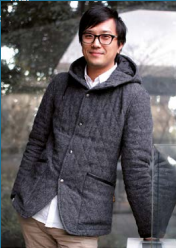
Keio University
''Thanks to Leti’s
leadership, culturally diverse
groups with a range of
skillsets were able to work
together from across the globe
to drive a significant Smart
City project to completion, said Professor Takuro Yonezawa.
Keio University’s collaboration with Leti
started in 2013, with the Cloud of Things
(ClouT) project, which was funded by
the European Commission (EC) and the
National Institute of Information and
Communications Technology (NICT) of
Japan. According to Professor Yonezawa,
“We knew Leti had very good experience
and technical vision in the Smart City
area. On top of that, they have very
good management skills, respecting and
maximizing each partners’ strength. These
are the reasons we decided to join the team
and start a partnership with Leti.
The goal of ClouT was to collect data
in different cities from a variety of data
sources, including IoT devices, social
networks, and mobiles. Leti’s sensiNact
software is an IoT platform that gathers
data from IoT devices supporting variousIoT protocols and platforms; Keio
University’s communication protocol
bridge enriches the Leti’s sensiNact
platform’s supported protocols catalogue.
By integrating the two, the team was able
to gather data from various European
and Japanese cities, including Santander,
Genova, Fujisawa and Mitaka, resulting in
a unique and massive urban data platform.
The team succeeded in collecting data
from more than 500 thousand physical and
virtual data sources by integrating Leti’s
sensiNact platform and Keio’s SOXFire
XMPP protocol implementation.
In 2016, ClouT was completed, and a new
project was kicked off. This new project,
called Big Data meeting Cloud and IoT (or
BigClouT), is jointly funded by the EC and
NIST through 2019.
“Not only does Leti have strong technical
skills, they are also very good at project
management,” said Professor Yonezawa.
“There are a number of cultural gaps
between the different groups working on
the project. Different academic teams,
different cities, and different companies
were involved. But Leti leads the project and
is very open to discussion. Leti’s teams are
very good at getting the diverse groups to
work together.”
The project has been more than just work.
“I’ve made a lot of friends through our
cooperation,” said Professor Yonezawa.
“Sometimes we go to Grenoble to work
with people from Leti—and I’ve always
appreciated the warm welcome. Our
cooperation has opened my mind in a
number of ways.”
|